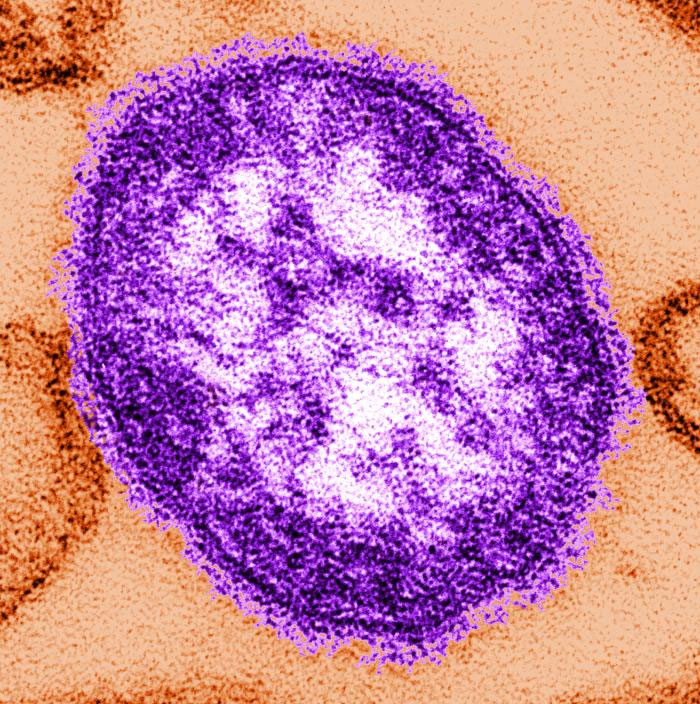Measles Threat Looms After Ebola Outbreak

Get the world’s most fascinating discoveries delivered straight to your inbox.
You are now subscribed
Your newsletter sign-up was successful
Want to add more newsletters?

Delivered Daily
Daily Newsletter
Sign up for the latest discoveries, groundbreaking research and fascinating breakthroughs that impact you and the wider world direct to your inbox.

Once a week
Life's Little Mysteries
Feed your curiosity with an exclusive mystery every week, solved with science and delivered direct to your inbox before it's seen anywhere else.

Once a week
How It Works
Sign up to our free science & technology newsletter for your weekly fix of fascinating articles, quick quizzes, amazing images, and more

Delivered daily
Space.com Newsletter
Breaking space news, the latest updates on rocket launches, skywatching events and more!

Once a month
Watch This Space
Sign up to our monthly entertainment newsletter to keep up with all our coverage of the latest sci-fi and space movies, tv shows, games and books.

Once a week
Night Sky This Week
Discover this week's must-see night sky events, moon phases, and stunning astrophotos. Sign up for our skywatching newsletter and explore the universe with us!
Join the club
Get full access to premium articles, exclusive features and a growing list of member rewards.
The Ebola outbreak in West Africa is disrupting the region's health care system, and one consequence is a dramatic drop in measles vaccinations, leaving millions of children potentially at risk for catching the disease, a new study suggests.
If efforts are not made to increase vaccinations there, a measles outbreak in the region could claim as many lives as the Ebola outbreak, or perhaps even more, the researchers said.
The Ebola epidemic has not only sickened tens of thousands of people and killed thousands, but it also has "caused severe disruption to health care services in the affected countries, including childhood vaccination programs, thus creating a second public health risk," study author Andy Tatem, a geographer at the University of Southampton in the United Kingdom, said in a statement.
Measles is one of the most transmittable infectious diseases, and outbreaks of the disease often follow humanitarian crises, such as war and natural disasters, the researchers said.
The researchers estimated that the Ebola outbreak has led to a 75-percent drop in childhood vaccination rates in Guinea, Liberia and Sierra Leone. The researchers projected that this summer, when it will have been 18 months since the Ebola outbreak began, more than 1 million children under age 5 in the three countries will be unvaccinated, compared with about 770,000 unvaccinated children before the Ebola outbreak. [5 Dangerous Vaccination Myths]
The researchers estimate that, if a measles outbreak were to occur in the region, it would cause more than 227,000 measles cases, and 5,000 deaths. In a worst-case scenario, a measles outbreak could cause as many as 16,000 deaths, which is more than the current number of Ebola deaths, they added. (Today, the World Health Organization said that the number of Ebola deaths have passed 10,000, according to the Associated Press.)
"It is crucial to have an aggressive regional vaccination program ready to run, as soon as the threat of Ebola begins to recede, to help counter the steep downturn in immunization rates," Tatem said.
Get the world’s most fascinating discoveries delivered straight to your inbox.
A coordinated campaign across the three countries to provide children with measles vaccines and other childhood vaccinations "could thwart a second public health disaster," the researchers said.
"While the downstream effects of Ebola are many, we can actually do something about measles relatively cheaply and easily, saving many lives by restarting derailed vaccination campaigns," Justin Lessler, an assistant professor at the Johns Hopkins Bloomberg School of Public Health and one of the researchers on the new study, said in a statement.
It's important to note that the study results are estimates — only limited data are available on the actual rates of vaccination in Guinea, Liberia and Sierra Leone because of the rapidly changing Ebola situation, the researchers said. But the researches' estimation that there has been a 75-percent drop in vaccination rates is consistent with surveys of health care providers in the region, they said.
The study will be published in the March 13 issue of the journal Science.
Follow Rachael Rettner @RachaelRettner. FollowLive Science @livescience, Facebook& Google+. Original article on Live Science.

Rachael is a Live Science contributor, and was a former channel editor and senior writer for Live Science between 2010 and 2022. She has a master's degree in journalism from New York University's Science, Health and Environmental Reporting Program. She also holds a B.S. in molecular biology and an M.S. in biology from the University of California, San Diego. Her work has appeared in Scienceline, The Washington Post and Scientific American.
 Live Science Plus
Live Science Plus










